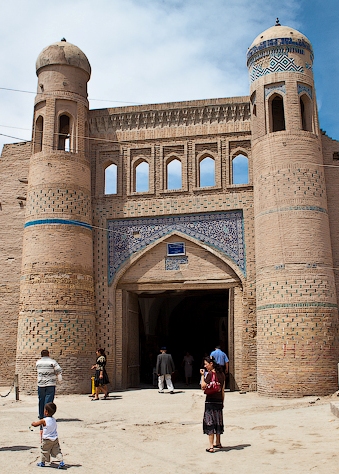|
Category
|
Palvon Darvoza Gate
Actually do Pahlavan-Darwaza gate with battlements and towers are located on the side of the intersection of the city wall. The facade of the gate is decorated in the form of an arched portal, which extends in the direction of "Dash-kucha" (stone street) - a corridor blocked by a chain of six domes. Over the entrance arch is a cross-cutting many-domed shopping mall - "Tim", on both sides of which there are shops of merchants and small bath room. When you sign over the gate remained a marble slab with the historical inscription "Shahri Khiva" (Khiva city) and date of construction - 1221 Hijrah (the Muslim chronology), ie 1806. It is the oldest part of the building, which is connected to the Anusha Khan bath. Construction of the gates was completed by Alla-Kuli-Khan in 1835. Right from the gate at the exit of Ichan-Kala until 1873 housed the slave market, and in the niches of the gate runaway slaves and rebels awaited their fate. There is also disclosed Khan's orders and committed massacres of criminals. The gates are named after the poet and undefeated wrestler Pahlavan (or Palvan) Mahmoud, who eventually became a revered feast that is the patron saint of the city. "Pahlavan" stands for "strongman, athlete" At the site of his grave behind the Juma Mosque built the most magnificent mausoleum in the city. In addition to the gate, in honor of Palavan Mahmud was named chief "aryk" (channel) of the city, supplying water to Khiva - "Palvan-yab". |
 One of the busiest places of the medieval square in front of Khiva was Palvon-Darvoza - East Gate of the citadel of Khiva - Ichan-Kala. Here, in the XVII century, were built Anush Khan baths and one-storey building madrassas Hodzhamberdy-biy. The chain structures of the ensemble have Palvan-Darwaza also constitute gallery Pahlavan-Darwaza, madrasas Allakuli Khan, Tim (trading dome), a caravanserai, and on the other side of the square - madrassas Kutlug Murad-inak and Tash Hawli palace. The complex of buildings was created as the vital necessity arises. Saturation of the buildings was so great that some of them were beyond the walls of Ichan-Kala.
One of the busiest places of the medieval square in front of Khiva was Palvon-Darvoza - East Gate of the citadel of Khiva - Ichan-Kala. Here, in the XVII century, were built Anush Khan baths and one-storey building madrassas Hodzhamberdy-biy. The chain structures of the ensemble have Palvan-Darwaza also constitute gallery Pahlavan-Darwaza, madrasas Allakuli Khan, Tim (trading dome), a caravanserai, and on the other side of the square - madrassas Kutlug Murad-inak and Tash Hawli palace. The complex of buildings was created as the vital necessity arises. Saturation of the buildings was so great that some of them were beyond the walls of Ichan-Kala.














